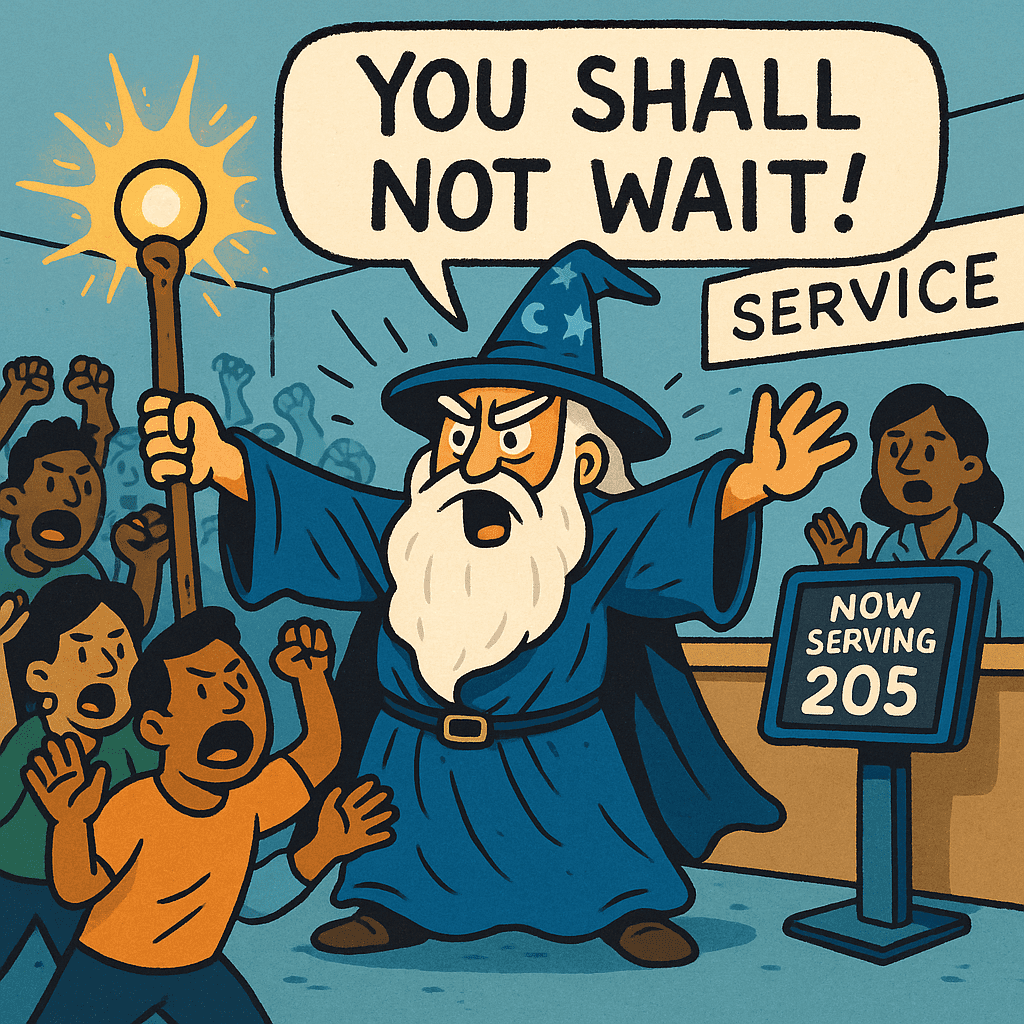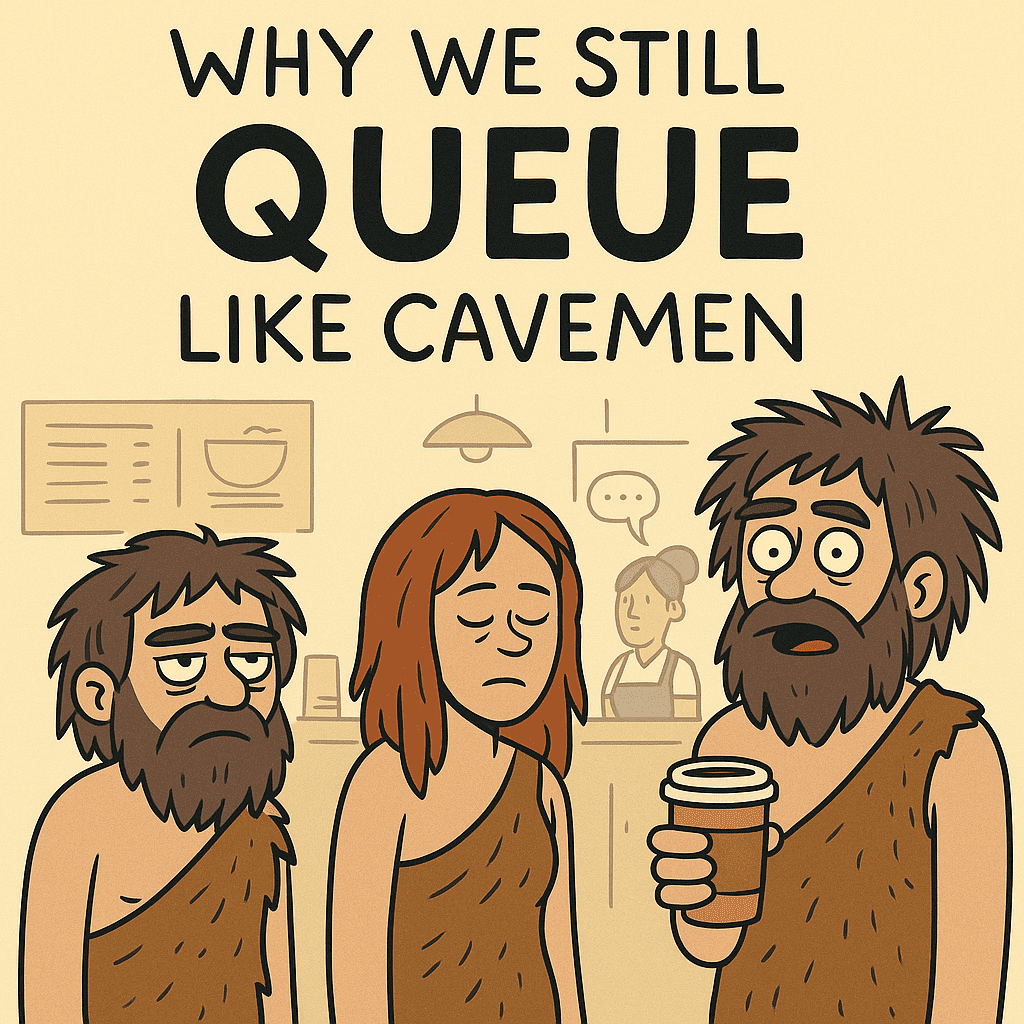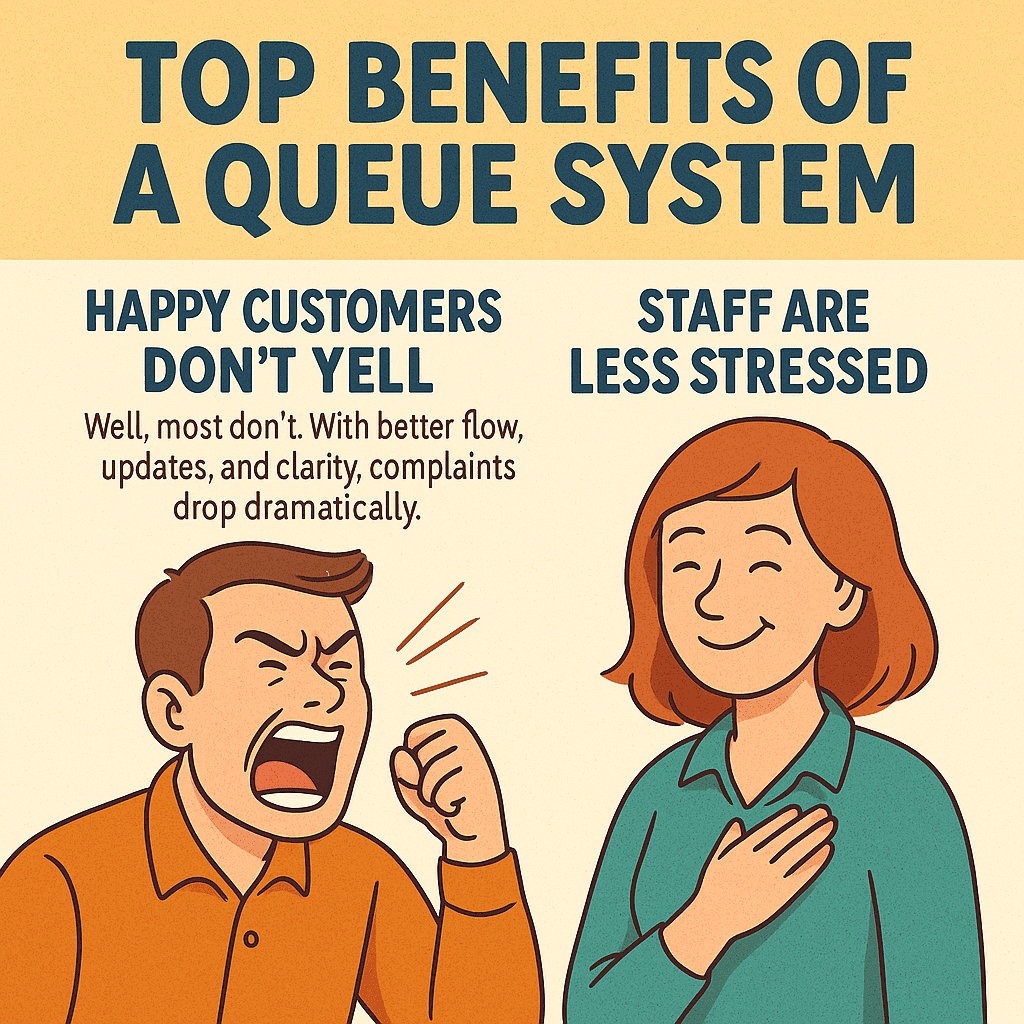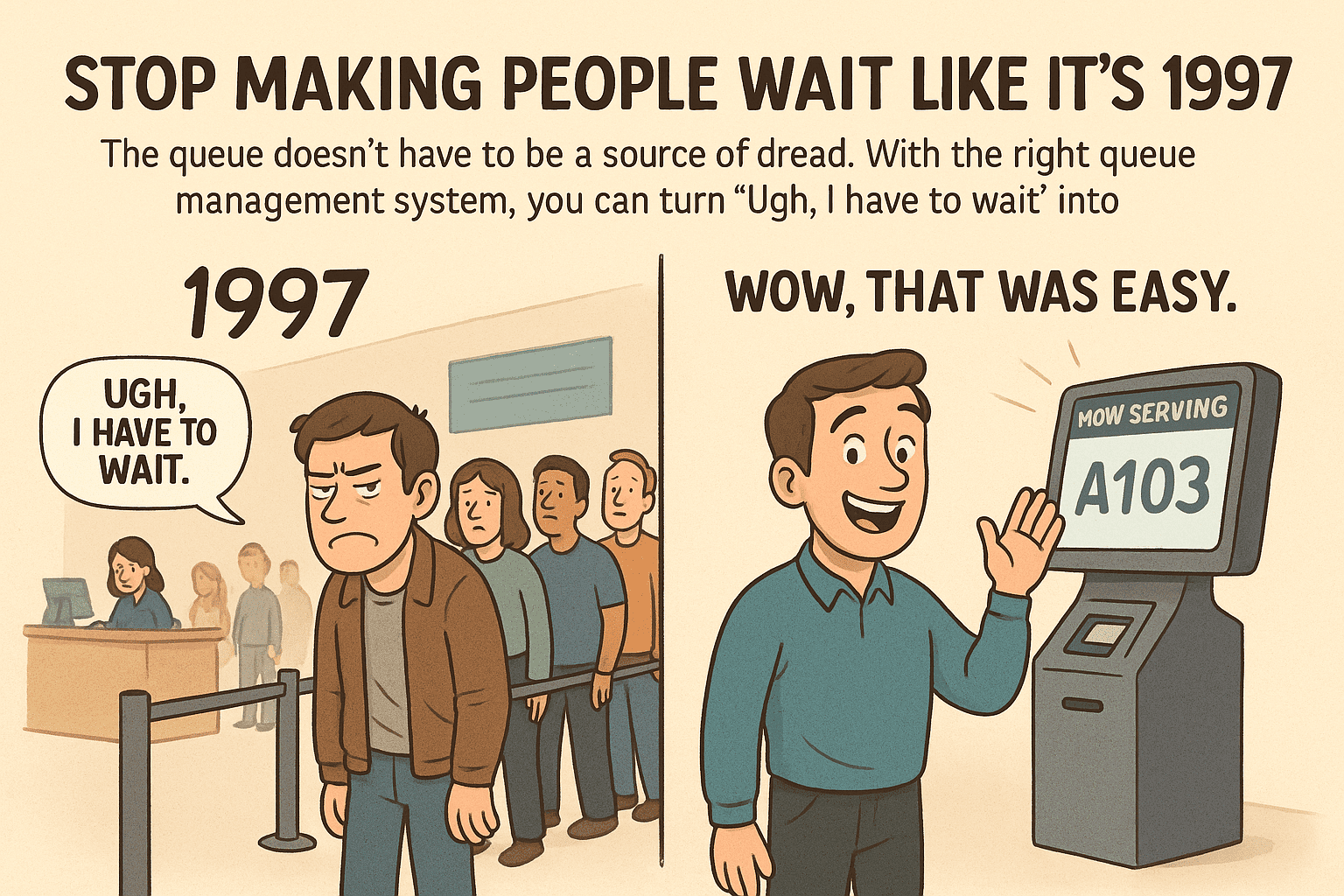Queue Management System: Saving Humanity from Boring Waiting Rooms Since... Well, Now
How the Queue Management System Rescues Us from Dull Waiting Rooms

Gandalf Stops the Wait – Queue Management Hero Image by QueueAway
Let’s be honest: nobody wants to stand in a queue. Not even British people, and queuing is basically their national pastime. From waiting in line for coffee to forming a human snake at the Doctors, the queue is society’s most politely-ignored nightmare.
Enter the Queue Management System—the unsung hero of modern civilization. It's like Gandalf in a world of customer service chaos, standing firm and shouting, “You shall not wait!”
This blog isn’t just about eliminating lines (though, that’s pretty cool). It's about improving your business, impressing your customers, and maybe—just maybe—helping humanity level up its patience game without relying on stale magazines in reception areas.
What Is a Queue Management System?
Let’s break it down like a funky 80s instructional video.
A queue management system (QMS) is a piece of queue management software (and sometimes hardware) that makes waiting in line suck less. It replaces angry crowds, mumbled "I think I'm next," and passive-aggressive sighs with smooth digital systems that:
Organize customers into queues
Let people check in virtually
Notify them when it's their turn
Make staff look like logistical geniuses
Basically, it’s like putting a traffic cop, a personal assistant, and a mind reader into your business… without the HR paperwork.
Why We Still Queue Like Cavemen (and How to Fix It With a Queue Management System)

Why We Still Queue Like Cavemen? A Look at Modern Queuing.
Humans have evolved from hunting mammoths to ordering lattes with oat milk—but somehow we’re still standing in queues like it's 1347 and the local blacksmith is backlogged.
Let’s fix that.
1. Because “Order” Is a Human Construct… That No One Respects
People have different definitions of what "next" means. Some think standing closest to the counter is a power move. Others treat the queue like a networking event.
A queue management system brings order to this chaos with digital tickets, clear numbers, and notifications. No eye contact required.
Bad customer service costs businesses more than $75 billion a year… Forbes – The Cost of Poor Customer Service
If you’re ready to replace ‘guess and wait’ with data and results, check out our smart queue software guide.
2. We Like Surprises, Just Not When Waiting
Waiting without knowing how long you’ll be waiting is basically psychological warfare. A good virtual queue solution gives people an ETA. Knowing it's “13 minutes” instead of “whenever Janet finishes asking for a refund from 2009” is oddly comforting.
3. It’s 2025. We Have Apps for Everything.
If your phone can track your dog’s mood and order cheese at 2am, it can definitely manage your spot in line.
In 2025, customers expect to check in, wait, and get served — all from their phone… Statista – Mobile Internet Traffic Share.
Anatomy of a Glorious Queue Management System
Let’s dissect a modern queue management software suite like it’s the Terminator—but instead of world domination, it's here to optimize customer flow and tell Karen to wait her turn.
🧍♂️ Customer Interface
How do people get into the queue? They can:
Tap a screen
Scan a QR code
Use a mobile app
Whisper into a magic conch shell (okay, not yet)
🧠 Queue Logic Engine
This is where the wizardry happens. It decides:
Who goes next (fairly, no bribes accepted)
How long someone will wait
Which staff member gets the next customer
👩💻 Staff Interface
Employees see:
Who they’re serving next
What they’re coming in for
How many times that person’s asked “Is it my turn yet?”
📺 Notifications & Digital Signage
Screens, buzzers, SMS—whatever it takes to make people look up from their phones and realize it’s go time.
📊 Analytics
Because nothing says “I’ve got my life together” like a report showing your average wait time went from 23 minutes to 7.
Data-driven businesses significantly outperform competitors on customer experience… McKinsey – Age of Analytics
The Many Faces of Queue Management Systems
There are more types of queue management systems than there are excuses for showing up late. Let’s meet the contenders.
If you’re looking for a more strategic overview, this ultimate guide to queue management systems covers everything you need.
FIFO (First In, First Out) – Like the bread aisle, the first one in is the first one out.
Virtual Queue Systems – The holy grail. Customers wait from anywhere—their car, a coffee shop, or even the pub.
Appointment-Based Systems – Set it and forget it.
Multi-Service Queues – Different services, different lines, one system to rule them all.
Mobile Queue Management – The full experience in your pocket.
Explore virtual queue solutions in action.
How a Queue Management System Benefits Both Businesses and Customers

Top Benefits of a Queue Management System – Happy Customers & Less Stressed Staff
💨 1. Faster Service
Shorter wait times = happier customers = less queue-zillas.
😃 2. Happy Customers Don’t Yell
Well, most don’t. With better flow, updates, and clarity, complaints drop dramatically.
According to Forbes, 86% of customers are willing to pay more for a better experience.
🤹 3. Staff Are Less Stressed
No more guesswork or double-bookings.
📈 4. Delicious Analytics
Track trends, see who’s slacking, and wow your boss in Monday meetings.
🌟 5. Makes You Look Like a Tech Wizard
Your competitors still use paper tickets. You’ve got mobile check-ins. Who’s winning?
For a serious deep dive, check out our comprehensive guide to revolutionizing customer experience.
Who Needs a Queue Management System? (Spoiler: Pretty Much Everyone)
If your business involves more than one human showing up at once, you probably need a queue management system. Especially:
🏥 Healthcare
🏦 Banks
🏛 Government Offices
🛍 Retail
Retail stores, for example, benefit from modern queue systems that go beyond paper tickets
🏨 Hospitality
Real-World Wins (Because You Deserve Proof)
NHS Clinics
Wait times ↓ 27%, patient satisfaction ↑ 18%
HSBC
Efficiency ↑ 21%
Paper ticket shredders… let go (we assume)
Starbucks Reserve
Mobile queue = artisanal coffee + less eye contact with strangers
Features You Didn’t Know You Needed (But Totally Do)
✅ Omnichannel check-ins
✅ AI-powered forecasting
✅ Multi-location control
✅ Real-time dashboards
✅ CRM integrations
✅ Built-in escape from Karen (well, almost)
Future of a Queue Management System (Yes, It Gets Fancier)
🤖 AI-Predictive Queues – Predict customer flow
📡 IoT Sensors – Monitor crowds in real time
🗣 Voice Assistants – “Alexa, check me in”
🎯 Hyper-Personalization – Your queue experience, tailored to you
Choosing the Right Queue Management System (Without Crying)
Shopping for queue management software is like dating. Look for:
Compatibility
Cloud support
Analytics
Custom branding
No surprise fees
Long-term support
As McKinsey reports, data-driven companies are 23x more likely to outperform competitors
Conclusion: Stop Making People Wait Like It’s 1997

Stop Making People Wait Like It’s 1997 – Queue Management System by QueueAway
The queue doesn’t have to be a source of dread. With the right queue management system, you can turn “Ugh, I have to wait” into “Wow, that was easy.”
You’ll boost satisfaction, reduce chaos, and finally stop printing paper tickets that no one can read anyway.
TL;DR for the ADHD Crowd
QMS = good
Wait times = bad
QueueAway = excellent
Bonus Plug (Because We’re Subtle Like That)
Want a queue management system app that:
Works out of the box
Doesn’t require an IT degree
Makes you look like it’s already 2030?
Try QueueAway — because queues are so last century.
FAQ Section
Q: What is a queue management system?
A: It’s software that organizes customer flow, reduces wait times, and improves service using virtual queuing and real-time updates.
Q: How do virtual queue solutions work?
A: They let customers check in remotely, receive updates, and wait comfortably—no more crowding or confusion.
Q: What are the benefits of using queue management software?
A: Better efficiency, reduced frustration, valuable analytics, and happier customers.
Q: Who can use queue management systems?
A: Retailers, clinics, banks, salons, restaurants—anywhere people wait.

